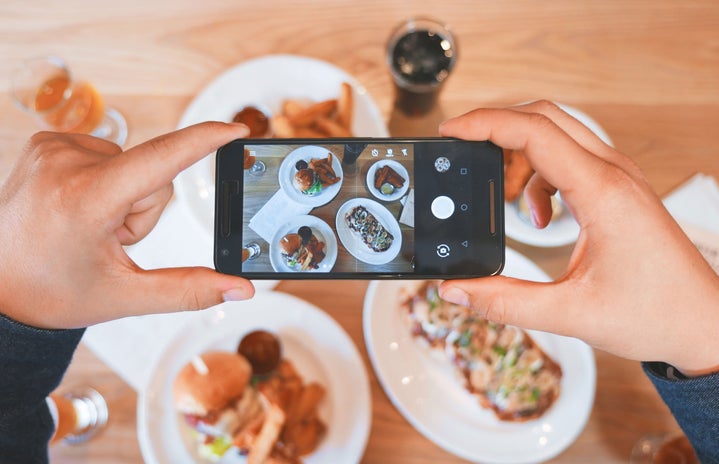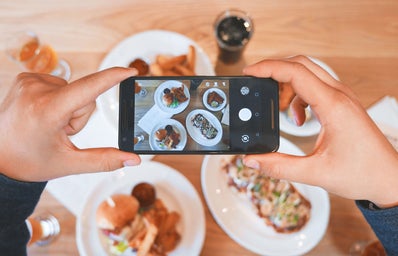Social Media is a great tool for staying in contact with people and updating everyone about our lives. It is a tool that can be used to express ourselves and show who we are. That is all good and fun, but social media is not always positive. It is also a negative, especially when it comes to body image.
The influence of social media on body image is even more noticeable during the Halloween season. It allows people to dress up and be a new person for a day. I mean what is better than candy, parties, dressing up, and being able to go crazy for a night? That behavior is to be expected on Halloween. But as we have gotten older, it has transformed from candy and fun so something more serious. Halloween can be fun and spooky, but the stigma around dressing up for Halloween in college can be damaging to self esteem. Pairing that with the influence of social media takes that damage to a whole new level.
Social Media is one of our peers. It is called a “Super Peer” because it holds this power over people and is very addicting. People post everything on social media. I post on Instagram almost everyday and on Facebook at least once a week. Social media is everywhere and it has become something that we let define us. People get approval and self-esteem from how many likes they get on a picture or how many comments they get saying how good they look. The amount of likes or comments that we get act as a rating scale. Social Media is used to help show how likable and attractive we are. Celebrities post pictures of themselves and how ‘perfect’ they look. Unfortunately, most everyone – including us- compares themselves to celebrities and how good they look. We want their hair, clothes, body type, everything. We want to be them. We allow celebrities and societies to tell us what we can and cannot wear. We can wear crop tops if we have abs and no body fat. There are “rules” about who can wear a crop top and who can’t. There are rules on what we can and can’t wear, what we should or should not post. There are higher rates in depression with people who have social media accounts. Also, social media has led people to becoming obsessed with their bodies and becoming thinner. Social media is linked to eating disorders because it is correlated to body obsession. People think that they need social media to be accepted and basically in order to function everyday, but it is ultimately detrimental to our well being.
So how is Halloween a negative when it allows people to be someone else for a night? Well as we talked about before, social media and media talk about what people should wear. Halloween used to be a time where people did not get judged for who they dressed up as. Now it is a basically a contest on who can look the best in their costume, not who has the best costume. So those who “don’t meet the criteria” for a crop top need to find a costume that covers up their “imperfect” body. Also, what do most people want to do with their Halloween pictures? Easy, they want to post them! But who wants a post a picture when there is a worry of judgement or not reaching a certain number of likes. People seek approval on outfits from people whose opinions don’t matter.
Halloween has also become a time where people take their creativity to a new level and not in a good way. Costumes have become made of less and less fabric so girls can show off more skin. Which if a girl wants to do that, power to her. But instead of people supporting someone in wearing something maybe more revealing, they judge. There are judgements and critiques. Halloween is not the time to make people wish they hadn’t spent all that time getting ready and putting on a costume that will just get ruined by others. Costumes have also changed in a different way. For example, this year there was a new costume called ‘Anna Rexia’. It is the apparently sexy version of the well known eating disorder Anorexia. It stirred up a lot of controversy, especially from survivors of eating disorders. Honestly, the controversy is solidly found because a costume like that is a little twisted. There is nothing sexy or spooky about having an eating disorder. So why make it a Halloween costume?
The point of this article is not to depress people or to complain. It is is about how we can make a difference and make social media and occasions like Halloween positive again! How do we do that, you ask?
Luckily, many women are recognizing the negative effects social media can have and are trying to put a positive spin on it. Women have been empowering their peers through hashtags like #rockthecrop and, on a larger scale, movements such as Dove’s Campaign for Real Beauty. Women are using social media to reach out and empower one another.
The problem with social media is that we give it the power to influence how we feel about ourselves and our bodies. But if we are able to harness its powers to encourage self love, all women (and men!) will be more confident in how they feel and look.
A huge part of the body positive movement has taken place on Instagram. Accounts such as StyleHasNoSize and ProjectHeal promote everything from eating disorder recovery to support for size diversity. These accounts post pictures of inspirational quotes, healthy meals, and women enjoying themselves despite their body type, skin color, or any other myriad of differences that make us unique.
The people behind these accounts denounce body shaming for any multitude of reasons. They call for more realistic role models; for women we can relate to.
Celebrities have also begun to speak out on beauty standards. For example, Cameron Diaz wrote a book that has an accompanying Instagram account called “The Body Book.” In the book, Diaz acknowledges that she is a role model and aims to inspire women by giving them “ways to love your amazing body.”
Another celebrity who is promoting self love is Demi Lovato. In the past, Lovato has attempted to cultivate the self-love of her followers by using #NMM (No Makeup Monday) to inspire confidence in natural beauty. Lovato has recently released a single called “Confident”, which she prefaced with a Vanity Fair photoshoot. The pictures she posted on Instagram were accompanied with the hashtag #confident and the explanation that this seemingly risque shoot was not to scandalize or self-promote, but to empower others. Her rules for the Vanity Fair shoot were simple: No makeup, no clothes, and no retouching. This was her way of leading by example; if she is a role model who loves herself and her body for what it is, then others can too.
Lovato asks, “WHAT’S WRONG WITH BEING CONFIDENT?”
Ultimately, social media only has negative effects on our self esteem if we let it. Ignoring standards and stereotypes, while realizing your inherent worth and beauty is the first step towards self acceptance.
So practice self care, cultivate self love, recognize your beauty, and surround yourself with people who encourage these principles. The goal of these movements is to defy beauty standards, to embrace the body we have, and to support one another through this positivity.

